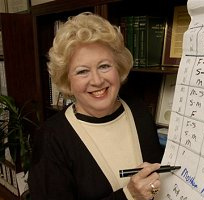SERVICES
Types of Mediation Practice
Family Related:
- Divorce (All Issues Pre and Post Decree)
- Parenting Plans attending divorce
- Marital Mediation (Mediate the dispute within the marriage, instead of the terms of the divorce?)
- Pre-Marital (Your money, my money, our money)
- Parent -Teens
- Probate - Will Disputes
- Step-parenting
- Gay and Lesbian Issues (Coming out / parting)
- Elder issues
Business Related:
- Commercial (Vendor-Vendee)
- Employment Discrimination
- E.E.O.C. (VII pre or post charge)
- Americans with Disabilities
- Sexual Harassment (special training)
- Family Business Disputes
- Labor - Management
- Landlord -Tenant
- Partnership Dissolution
- Professional Fee Disputes
- Workplace tension
Other Areas of Mediation:
- Church-Religious Groups
- Education
- Student peer mediation ( 12 hour Peermed Training )
- Campus problems
- Special Education
- Tenure
- Community Issues
- Housing Development Disputes
- Neighborhood Disputes
- International
- Organizations (Within - Between)
- Public Policy Issues
Additional Professional Services:
- Advanced Mediation Training
- Meeting Facilitation
- Med-Arb
- Mediation Consultation
- Conflict Resolution System Design
- Mediation Training 40/46 hour Tennessee Rule 31 approved family law/divorce basic course
- Consensus Building
- Divorce Seminars
- Facilitation
- Student Peer-Mediation
- Marital Mediation
- Training - 12 hour course
- Personal Injury Negotiations
Professional Associations:
- ABA (American Bar Association), ADR and Family Law Sections
- ACR (Association for Conflict Resolution) Family and Workplace Sections
- APFM (Academy of Professional Family Mediators)
- MAT (Mediation Association of Tennessee, Founder & President )
- MBA (Memphis Bar Association) ADR and Family Law Section, President
- SPIDR (Society of Professionals in Dispute Resolution) Now ACR
- TBA (Tennessee Bar Association)
- ADR, Family Law Sections, Family Law Code Revision Commission
- TAPM (Tennessee Association of Professional Mediators)
I prefer the facilitative method, facilitating negotiations between the parties face to face rather than exclusively shuttling back and forth between separated parties. Clients report they feel more involved in the decision-making process, each having had a chance to be heard. Facilitative mediation hastens trust of the mediator; there is less wondering and worrying what’s being said in the other room.
In facilitative mediation, each client gets to tell his or her story to the other. Options for possible resolution get listed (I use a flip since I don’t know if the person sitting in front of me is a right brain or left brain learner), discussed, and chosen. And yes, this process allows each disputant to observe just how each may be perceived by a judge or jury. Facilitative mediators may meet in private sessions with each side to go through a specific process that helps the attorney chart and evaluate the case for the client.
Transformative mediation, which uses the facilitative method, is more concerned with the process of conflict resolution than the resolution itself. This is often contrasted with evaluative mediation that is so "resolution focused" you may see the mediator evaluating the case for each side and then telling them how they ought to settle. There is a form of ADR called Early Neutral Evaluation that does just that. Employing empowerment and recognition as techniques, transformative mediation hopes to transform the clients from angry, self- centered, win/lose positioned disputants to cooperative, acknowledging, now and future focused, responsible ones. And maybe even get to resolution. It allows a lot of leeway for the clients to frame the issues and the discussion. Transformative mediators use the facilitative style. Thus, should the clients not resolve all issues in that mediation session, the likelihood of them being able to do so before resorting to litigation is high. According to Professor Robert Baruch Bush of Hosta University and his co-author Joseph Folger in their book, The Promise of Mediation , the mediation process should promise something more to the client than just closing the file.
Perhaps my style is best described by Professor/attorney/mediator David Hoffman in his article "Confessions of a Problem-Solving Mediator" in the 1999 Volume 23 Number 3 newsletter of the Society of Professional in Dispute Resolution. He contrasted transformative mediation with problem solving and suggested we experienced mediators intuitively engage techniques that fall somewhere in between.
Again, the trick and talent of the experienced mediator is to know what style to use -- and when.
Certification of mediation specialist is not currently available in Tennessee. Approved by the Tennessee Supreme Court’s Alternate Dispute Commission under its Rule 31 for civil law and family law cases.

